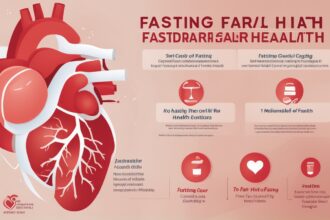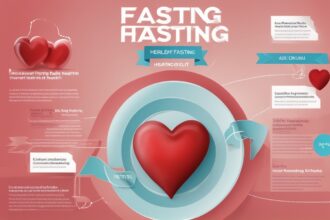Intermittent fasting (IF) has gained significant attention in recent years as a popular dietary approach not only for weight loss but also for its potential health benefits. Among these benefits, the impact of intermittent fasting on heart health has emerged as a promising area of research. By alternating periods of eating with periods of fasting, IF may offer protective effects on cardiovascular health, reducing risk factors such as high blood pressure, cholesterol levels, and inflammation. In this post, we’ll dive deep into the intermittent fasting heart benefits and explore how this eating pattern could support a healthier heart.
What Is Intermittent Fasting?
Intermittent fasting is not a diet in the traditional sense but rather an eating pattern that cycles between periods of eating and fasting. Common methods include the 16/8 method (fasting for 16 hours and eating during an 8-hour window), the 5:2 diet (eating normally for five days and restricting calories on two non-consecutive days), and alternate-day fasting. The primary goal of IF is to allow the body to enter a state of rest and repair, which can trigger various physiological benefits. When it comes to heart health, intermittent fasting may help by improving metabolic markers and reducing stress on the cardiovascular system.
How Intermittent Fasting Impacts Heart Health
One of the most compelling reasons to consider intermittent fasting for heart benefits is its ability to improve key cardiovascular risk factors. Research suggests that IF can lower blood pressure, reduce bad cholesterol (LDL), and increase good cholesterol (HDL). Additionally, fasting periods may promote autophagy—a process where the body cleans out damaged cells and regenerates healthier ones—which can protect the heart from oxidative stress and inflammation. By reducing these risk factors, intermittent fasting may lower the likelihood of developing heart disease, a leading cause of death worldwide.
For more insights on how lifestyle changes can support cardiovascular wellness, check out our post on heart-healthy diets.
Intermittent Fasting and Weight Management for Heart Health
Excess weight, particularly around the abdomen, is a significant risk factor for heart disease. Intermittent fasting can aid in weight loss by reducing overall calorie intake and improving insulin sensitivity, which helps the body burn fat more efficiently. Losing weight through IF can decrease the strain on the heart, lower blood pressure, and reduce the risk of conditions like atherosclerosis (hardening of the arteries). Studies have shown that even modest weight loss can lead to substantial improvements in heart health, making IF a valuable tool for those looking to shed pounds sustainably.
Learn more about maintaining a healthy weight with our guide to cardiovascular exercises for beginners.
Reducing Inflammation and Oxidative Stress
Chronic inflammation and oxidative stress are major contributors to heart disease, as they can damage blood vessels and lead to plaque buildup. Intermittent fasting has been shown to reduce inflammatory markers in the body, such as C-reactive protein (CRP), and decrease oxidative damage. During fasting periods, the body shifts into a state of repair, which may help protect the cardiovascular system from long-term harm. By incorporating intermittent fasting into your routine, you could potentially lower inflammation and support a healthier heart.
Improving Blood Sugar and Insulin Sensitivity
High blood sugar and insulin resistance are closely linked to an increased risk of heart disease. Intermittent fasting can improve insulin sensitivity by allowing the body to rest from constant food intake, which helps regulate blood sugar levels more effectively. Better blood sugar control reduces the risk of diabetes—a condition that significantly raises the likelihood of cardiovascular issues. For individuals with prediabetes or type 2 diabetes, intermittent fasting may offer heart benefits by addressing these underlying metabolic problems.
Explore additional strategies for managing blood sugar in our article on heart-healthy nutrition tips.
Potential Risks and Considerations
While the intermittent fasting heart benefits are promising, this approach may not be suitable for everyone. Individuals with certain medical conditions, such as heart arrhythmias or low blood pressure, should consult a healthcare provider before starting IF. Fasting can also lead to side effects like hunger, irritability, or fatigue, especially during the initial adjustment period. It’s essential to approach intermittent fasting with caution and ensure it aligns with your overall health goals and lifestyle. Always prioritize balanced nutrition during eating windows to avoid deficiencies that could negatively impact heart health.
Disclaimer: The information provided in this article is for educational purposes only and should not be considered medical advice. Intermittent fasting may not be suitable for everyone, and individual results may vary. Before starting any new dietary or fasting regimen, consult with a healthcare professional or registered dietitian, especially if you have pre-existing health conditions or concerns about heart health.
References
- American Heart Association: Could Intermittent Fasting Improve Heart Health?
- National Institutes of Health: Effects of Intermittent Fasting on Cardiovascular Health
- Mayo Clinic: Intermittent Fasting and Heart Health
- Harvard Health: Intermittent Fasting and Cardiovascular Benefits
- American Heart Association Journals: Intermittent Fasting and Metabolic Health
This content is for informational purposes only and not a substitute for professional advice.






